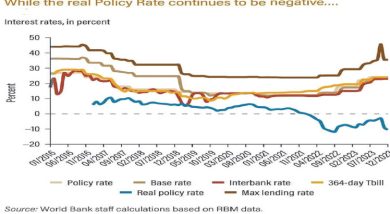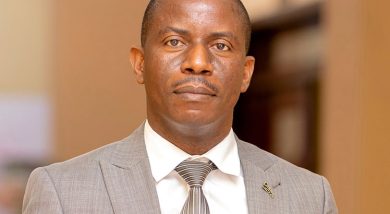Cashgate darkened the economy in 2013

That cashgate or the looting of huge billions of taxpayers’ money at Capital Hill became a household name for the remainder of the year is a fact no one can dispute.
On September 13, 2013 Malawians woke up to the astounding news that the former budget director at Ministry of Finance Paul Mphwiyo was shot as he drove into his home in Area 43. He absorbed three bullets.
Little did taxpayers know that his shooting was simply stirring the hornet’s nest and, consequently, blowing the truth out of a veil of secrecy at Capital Hill.
Rumour was rife that the shooting, which implicated former Justice and Constitutional Affairs minister Ralph Kasambara, was a ‘deal gone sour’ of which Mphwiyo himself denied vehemently when he appeared before the Public Accounts Committee (PAC) of Parliament.
After Mphwiyo’s shooting, a flurry of arrests engulfed Capital Hill which saw accounts assistants and other senior government officials being picked in connection with the misappropriation of huge sums of money.
An aggregation of the stolen money
The Financial Intelligence Unit (FIU) estimated that over K20 billion was stolen through the flawed Integrated Financial Management Information System (Ifmis) and The Nation later revealed that about K90 billion more was lost during the Democratic Progressive Party (DPP) administration, putting the sum stolen at over K110 billion.
Of course, it is a well-known fact that the figure is higher than K110 billion since revelations are unrelenting and investigations are still underway with a forensic audit still finding its way out.
We have calculated that K110 billion is enough to fund the entire Ministry of Education, Science and Technology, the Malawi Revenue Authority (MRA) and all government subvented organisations for a fiscal year in the current budget even without the helping hand of donors.

According to the draft estimates of expenditure on recurrent and capital budget for the financial year 2013/14 or budget document number four, the estimated expenses to the Ministry of Education is K73.3 billion, subvented organisations (K30.1 billion) and MRA (K10.3 billion).
Our calculations went further to reveal that the money is enough to train over 40 000 medical doctors at College of Medicine (CoM) for a year, boost the health sector and improve 16 500 classroom blocks and eventually save children from learning under the tree.
Government requires K2.8 million to train medical staff at CoM for five years. Malawi needs K350 million to build a full-fledged health centre that includes five new houses on average, according to Ministry of Health spokesperson Henry Chimbali.
Simply put it, with the K110 billion siphoned, Malawi Government could have used the money to construct 314 health centres.
The poor feel the cashgate pinch
We spoke to a crosssection of Malawians after cashgate revelations and these include guards, tailors, teachers, bankers, businesspersons, accountants, just to mention but a few.
Based on our random interactions, it was evident that it is the poor who are mostly feeling the pinch of the cashgate because the opportunity cost of the stolen money is the availability of essential drugs and other key social services that could have been made available across the country of which the poor are the main beneficiaries.
Business Review discovered that the main groups caught in the firing line are people who are unemployed, on low wages, the elderly and expectant women.
The cashgate is mainly hitting those people who depend solely on vital support from public services and social security such as free health care and education and that is what the Lilongwe-based Centre for Social Concern (Cfsc) said.
“Indirectly, the cashgate that is resulting in government cuts to public services is placing an impossible burden on people who have to step in and look after family members while doing paid work. As demand for care rises, a growing strain is placed on unpaid human resources and relationships,” Mathias Kafunda, Cfsc’s programme officer for economic governance told Business Review during the year.
He reasoned that with the revision of the budget services that could have helped meet the poors’ basic needs, such as health, are all being restructured and reduced.
Cashgate threatens forex availability
On November 7 2013, Malawi’s major donors under the Common Approach to Budget Support (Cabs) withheld budget support amounting to $150 million (K60 billion), citing the looting of public funds at Capital Hill.
Donor funds are the second source of foreign exchange in Malawi after tobacco, which wires in more than half of the country’s foreign exchange.
As such, the withheld money could have helped propel the availability of foreign exchange on the market at a time the economy is in its lean season.
That pressure is already mounting on the foreign exchange market is evident as manifested by the continued weakening of the kwacha against major foreign currencies, notably the dollar.
The local currency fell from around K330 in June to around K450, reflecting the mismatch between demand and supply of foreign exchange.
But Finance Minister Maxwell Mkwezalamba dispels such thinking and insisted during a recent interview in Lilongwe that the ceding of the kwacha to a dollar is simply a result of speculation on the market.
As it stands now, the International Monetary Fund (IMF) Board is scheduled to meet on January 10 and that Cabs donors are scheduled to meet again in March this year. The outcomes of these meetings would be crucial to the Malawi economy.
Unless donors rescind their decision and release their withheld money, history is on the verge of repeating itself when Malawi witnessed a severe foreign exchange drought which paralysed the manufacturing sector and, consequently, constrained Malawi’s economic growth rates.
Malawi’s monthly foreign exchange reserve requirement is pegged at $188.1 million, an upward revision from a monthly demand of $129 million some few months ago.
As such, the withheld $150 million, if injected into the economy, could help the country sustain the importation of imports for 24 days.
In the 2013/14 national budget, donors are accounting for 41 percent of the total budget.
Cashgate grounds business to a halt
We also spoke to a number of people who run various businesses in the capital city and other districts and they testified that business has slowed down due to cashgate.
A bottlestore owner at Kanengo in Lilongwe said his daily turn-over has been shrinking over the past two months and he suspects that the pouncing of looters at Capital Hill might have stopped the circulation of money at Kanengo and other bottle stores.
“The government is a biggest employer and when scrutiny at Capital Hill is intense then that could have a direct impact on the circulation of money in the country and that is what people in the business are seeing. Very few imbibers are invading my place,” said the bottlestore owner who did not want to be named.
A spareparts dealer in Lilongwe, Albert Nyasulu, said at a time the economy was said to be on track, it was the period when “dirty” money was circulating highly across the country.
He said the picking up of economic activity then was cosmetic and not genuine.
On this one, the Economic Empowerment Action Group (Eeag) interim president Lewis Chiwalo also confirmed the slowing down of business because of cashgate and told Business Review that business activity is not as the same as it was prior to the cashgate.
Fiscal, monetary policy bosses fear cashgate impact
We separately heard views from the Reserve Bank of Malawi (RBM) Governor Charles Chuka and Mkwezalamba on cashgate and their likely impact on the economy and fears were almost similar.
Chuka described cashgate as “too serious”, warning that the cost of the scandal could be too heavy on Malawi.
He said this when he appeared before the PAC to explain RBM’s role in cashgate.
“The matter at hand [cashgate] is too serious. The cost of cashgate will not be just in terms of the services that should have been provided to the people, it is going to be beyond that. The country as we are standing today is actually viewed as a country that has no systems,” said Chuka.
He said in view of cashgate, the private sector, cannot get credit lines now and added that because of the manner in which the matter has gone, RBM has paid the price in trying to contain the situation.
Mkwezalamba, on the other hand, was also worried about the likely erosion of economic gains that were recently made by Malawi in the wake of cashgate impacts.
Beginning March this year, the economy enjoyed a deceleration in the year-on-year inflation rate before a U-turn in October when the National Statistical Office (NSO) announced that the October rate had edged up by 0.5 percentage point from 21.7 percent in the preceding months.
The economy has also been accumulating adequate foreign exchange reserves since the adoption of a package of economic reforms, which at some point resulted in the local currency appreciating to the dollar resulting in high supply of dollars against demand on the market.
“Yes, looking back, indeed the numbers looked good as inflation was declining and the exchange rate stabilised. We were on the path to sustainable economic growth and we were expecting that by the end of the year, we will grow by 5.8 percent and that inflation would go down to 14 percent with interest rate below 20 percent,” said the minister.
Accountants condemn cashgate, call for professional civil service
The Institute of Chartered Accountants in Malawi (Icam) also condemned cashgate and called for urgent need to professionalise the civil service. Icam said it has not been sitting idle in the wake of the cashgate and revealed that it recently met official from the Office of the President and Cabinet (OPC) as well as the chairperson of PAC of Parliament on the same.
“Our recommendations contained short-term solutions such as how they could reinforce internal control to medium and long-term solutions that include the need to address challenges with political party funding, professionalising the civil service, among others,” said Icam president William Matambo.
He described the revelations of theft at Capital Hill as “multi-faceted” and requires a “multi-pronged” approach if Malawi is to solve the problem with finality.
Matambo said Icam volunteered to be part of the solution to solve cashgate to ensure that a repeat of such a national tragedy does not recur in future.
Way forward
As the economic situation worsens each passing day with cashgate revelations, it is imperative that government continues the current pace in implementing an action plan aimed at addressing cashgate and normalise the relationship with donors.
It is a fact that the country needs to restore its donor confidence in its Public Finance Management Systems so that the system is secure.
What Icam’s Matambo has said on cashgate, especially on the need for Malawi to have a professional civil service, is timely and needs to be taken seriously. Malawi cannot afford to see a few misguided civil servants milking a multitude of taxpayers.
In 2014, there is need for both the police and other players to intensify the hunt for other looters of public money, punishing them accordingly to deter would-be looters from siphoning taxpayers’ money.





